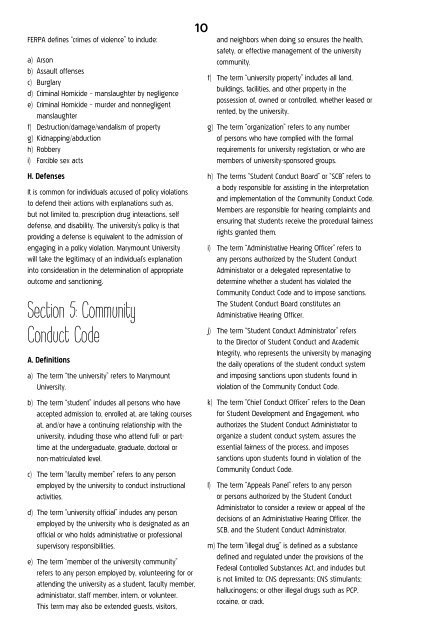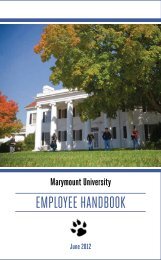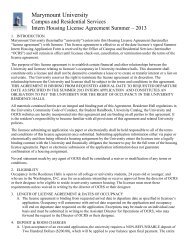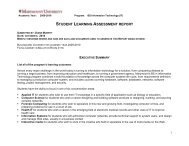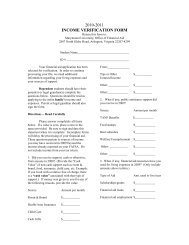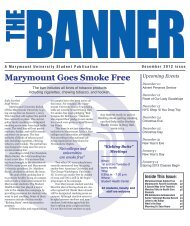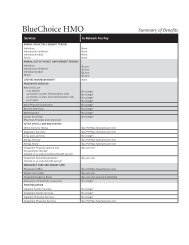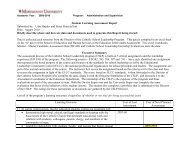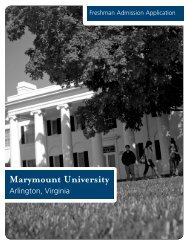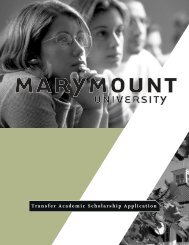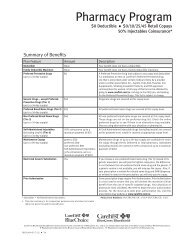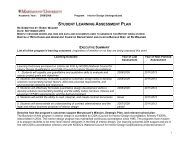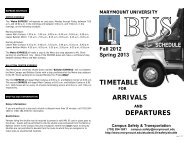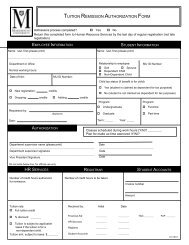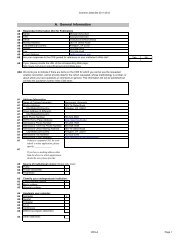Student Handbook - Marymount University
Student Handbook - Marymount University
Student Handbook - Marymount University
You also want an ePaper? Increase the reach of your titles
YUMPU automatically turns print PDFs into web optimized ePapers that Google loves.
FERPA defines “crimes of violence” to include:<br />
a) Arson<br />
b) Assault offenses<br />
c) Burglary<br />
d) Criminal Homicide – manslaughter by negligence<br />
e) Criminal Homicide – murder and nonnegligent<br />
manslaughter<br />
f) Destruction/damage/vandalism of property<br />
g) Kidnapping/abduction<br />
h) Robbery<br />
i) Forcible sex acts<br />
H. Defenses<br />
It is common for individuals accused of policy violations<br />
to defend their actions with explanations such as,<br />
but not limited to, prescription drug interactions, self<br />
defense, and disability. The university’s policy is that<br />
providing a defense is equivalent to the admission of<br />
engaging in a policy violation. <strong>Marymount</strong> <strong>University</strong><br />
will take the legitimacy of an individual’s explanation<br />
into consideration in the determination of appropriate<br />
outcome and sanctioning.<br />
Section 5: Community<br />
Conduct Code<br />
A. Definitions<br />
a) The term “the university” refers to <strong>Marymount</strong><br />
<strong>University</strong>.<br />
b) The term “student” includes all persons who have<br />
accepted admission to, enrolled at, are taking courses<br />
at, and/or have a continuing relationship with the<br />
university, including those who attend full- or parttime<br />
at the undergraduate, graduate, doctoral or<br />
non-matriculated level.<br />
c) The term “faculty member” refers to any person<br />
employed by the university to conduct instructional<br />
activities.<br />
d) The term “university official” includes any person<br />
employed by the university who is designated as an<br />
official or who holds administrative or professional<br />
supervisory responsibilities.<br />
e) The term “member of the university community”<br />
refers to any person employed by, volunteering for or<br />
attending the university as a student, faculty member,<br />
administrator, staff member, intern, or volunteer.<br />
This term may also be extended guests, visitors,<br />
10<br />
and neighbors when doing so ensures the health,<br />
safety, or effective management of the university<br />
community.<br />
f) The term “university property” includes all land,<br />
buildings, facilities, and other property in the<br />
possession of, owned or controlled, whether leased or<br />
rented, by the university.<br />
g) The term “organization” refers to any number<br />
of persons who have complied with the formal<br />
requirements for university registration, or who are<br />
members of university-sponsored groups.<br />
h) The terms “<strong>Student</strong> Conduct Board” or “SCB” refers to<br />
a body responsible for assisting in the interpretation<br />
and implementation of the Community Conduct Code.<br />
Members are responsible for hearing complaints and<br />
ensuring that students receive the procedural fairness<br />
rights granted them.<br />
i) The term “Administrative Hearing Officer” refers to<br />
any persons authorized by the <strong>Student</strong> Conduct<br />
Administrator or a delegated representative to<br />
determine whether a student has violated the<br />
Community Conduct Code and to impose sanctions.<br />
The <strong>Student</strong> Conduct Board constitutes an<br />
Administrative Hearing Officer.<br />
j) The term “<strong>Student</strong> Conduct Administrator” refers<br />
to the Director of <strong>Student</strong> Conduct and Academic<br />
Integrity, who represents the university by managing<br />
the daily operations of the student conduct system<br />
and imposing sanctions upon students found in<br />
violation of the Community Conduct Code.<br />
k) The term “Chief Conduct Officer” refers to the Dean<br />
for <strong>Student</strong> Development and Engagement, who<br />
authorizes the <strong>Student</strong> Conduct Administrator to<br />
organize a student conduct system, assures the<br />
essential fairness of the process, and imposes<br />
sanctions upon students found in violation of the<br />
Community Conduct Code.<br />
l) The term “Appeals Panel” refers to any person<br />
or persons authorized by the <strong>Student</strong> Conduct<br />
Administrator to consider a review or appeal of the<br />
decisions of an Administrative Hearing Officer, the<br />
SCB, and the <strong>Student</strong> Conduct Administrator.<br />
m) The term “illegal drug” is defined as a substance<br />
defined and regulated under the provisions of the<br />
Federal Controlled Substances Act, and includes but<br />
is not limited to: CNS depressants; CNS stimulants;<br />
hallucinogens; or other illegal drugs such as PCP,<br />
cocaine, or crack.


